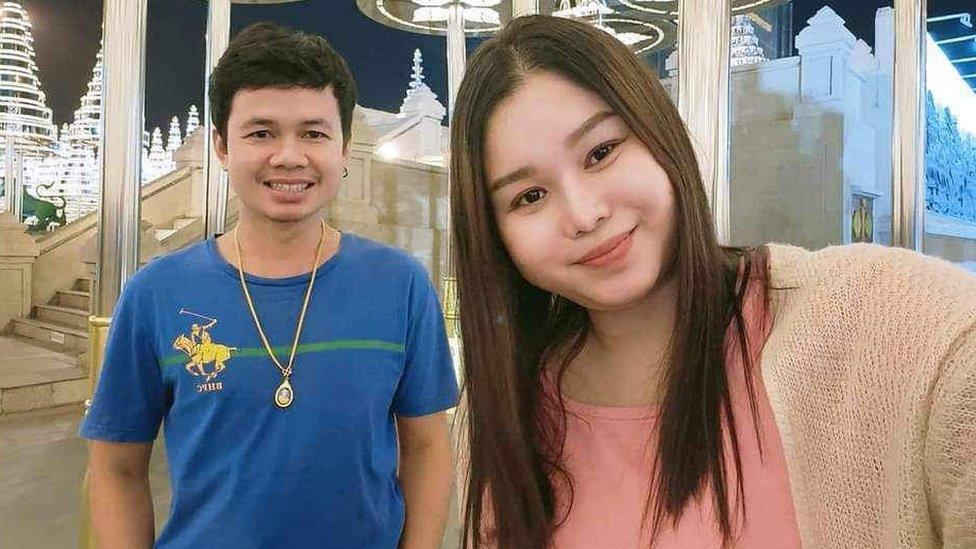Israel-Gaza: The man held with the hostages Israel mistakenly killed
- Published
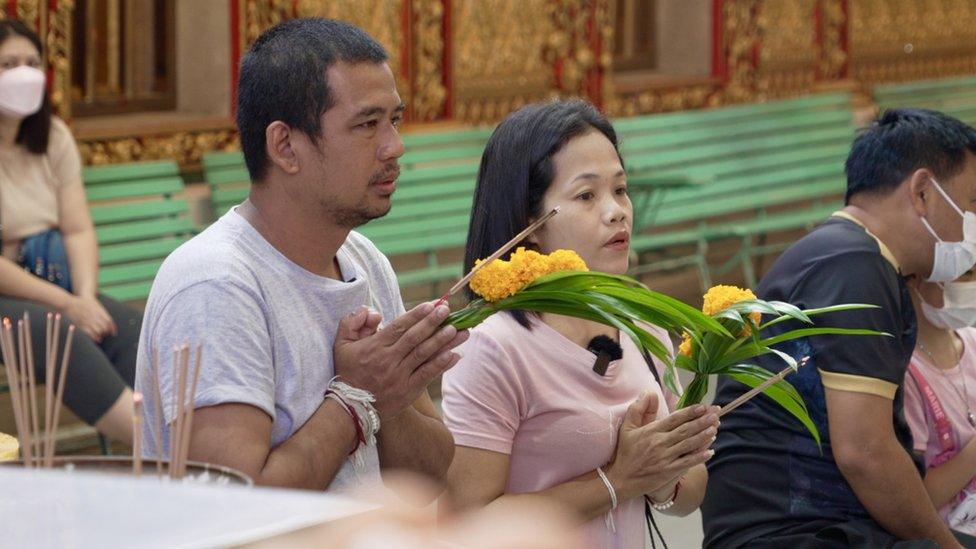
Like many from Thailand's poor north-east, Wichian Temthong left for Israel to find better-paid work
"Am I lucky or unlucky?" Wichian Temthong pondered the question. "I guess I'm lucky, because I'm still here, still alive."
The 37-year-old farm worker is one of 23 Thai hostages who were released by Hamas last month. Now Wichian is back in Thailand, living in a small room in an industrial suburb south of Bangkok with his wife Malai.
While he survived, three young Israeli men he met in captivity did not. They were mistakenly shot dead by Israeli soldiers.
Wichian had gone to Israel only in late September, driven like so many Thais from the poor north-east of the country to find better-paid work on Israeli farms. After nine days he was moved to an avocado orchard on the Kfar Aza kibbutz. He woke up on 7 October, his first morning there, to the sound of gunfire.
His fellow Thai workers assured him it was normal. But as the shooting got louder towards midday, they decided to lock themselves in one of the buildings. Before they could do that gunmen burst in, one holding a hand grenade. They started beating the Thais with their rifle butts.
"I crouched down like this and shouted 'Thailand, Thailand, Thailand', he said, showing how he pulled his arms over his head. "But they kept beating me. All I could do was keep my face down. One guy stamped on me with his feet. I crawled under the bed to hide. I tried to text my wife to say I was being taken, but they dragged me out by my leg."
Wichian was eventually taken down into tunnels deep under Gaza, and would be kept there for 51 days. His was a lonely ordeal, because he was the only Thai, and he speaks no English, so could only communicate through drawings and hand gestures.
Conditions were grim. The hostages were fed just once a day; sometimes this was no more than a piece of bread and a dried date.
"When I was distressed they would come and talk to me, to calm me down, but I could not understand them. The only way I got by was by thinking of the faces of my children, my wife and my mother.
"When there was nothing else to do, I'd just sit against the wall and meditate. I kept thinking about the same thing over and over, which was that I had to survive."
He remembers the other hostages who were with him in the tunnels; three young Israeli men - Yotam, Sammy and Alon - who remained in captivity after his release, only to be shot dead by Israeli soldiers as they came out, waving a white cloth, last Friday.
The Israel Defense Forces said they were shot because the soldiers were in a state of high alert, and were wary of being drawn into buildings rigged with explosives.
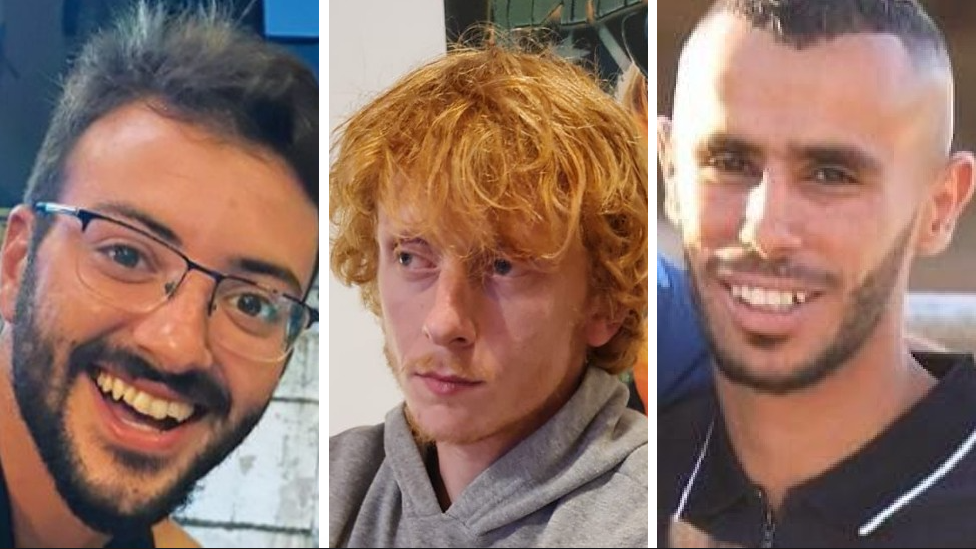
Left to right: Alon Shamriz, Yotam Haim and Samer Talalka
Wichian had just seen the news, with their photographs, when we arrived to interview him.
"Every day my foreign friends and I tried to support each other. We would shake hands and do fist bumps. They would cheer me up by hugging me and clapping my shoulder. But we could only communicate by using our hands."
He found out that Yotam was a drummer, and Sammy loved riding his motorbike, and worked in a chicken farm. Wichian tried to teach them some Thai words. Wichian said two of the Israelis were in the tunnel with him from day one. The third joined them on 9 October.
He says he was treated leniently by his captors, but that in their first weeks underground two of the Israelis were sometimes beaten with electric cables.
"We were always hungry. We could only sip our water. A large bottle had to last four to five days, a smaller bottler for two days."
He really suffered from not being able to wash. They were allowed to sleep in the day, not at night. They were always damp - nothing dried in the tunnels.
He kept himself busy by trying to clean their living area. He even helped the Hamas guards move rubble that came into the tunnel after it was struck by a bomb.
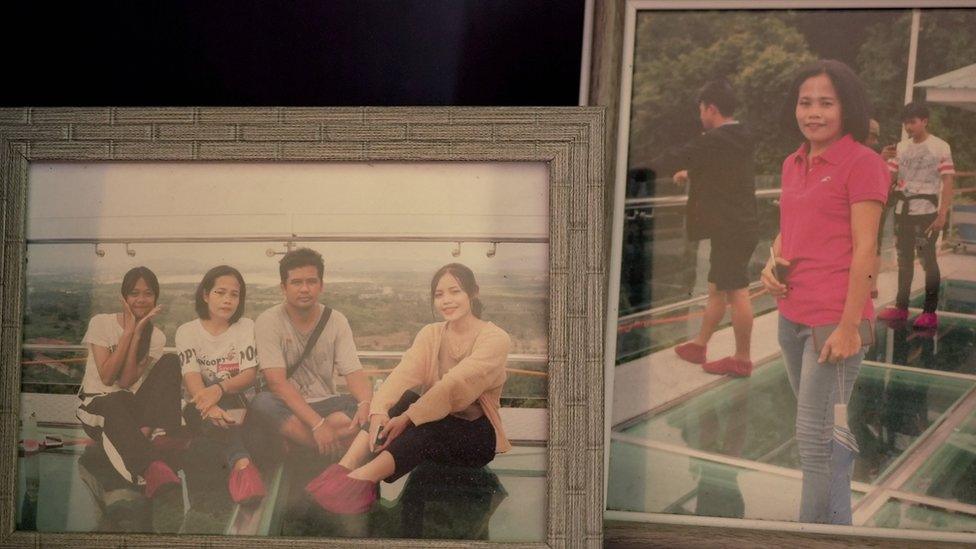
Wichian, seen in these pictures with his wife and two children, says he would go back to Israel just for the chance to earn, and save, a little more
After a month the four hostages were moved to a new tunnel. "At around 7pm they brought us up. But as soon as I saw it, my heart wanted to run back down to the tunnel.
"You could see bright lights everywhere from the aerial fighting. I heard drones flying all over the place, and the sound of gunfire. We had to run for 20 minutes, trying to avoid the drones."
Wichian says his captors encouraged him to count the days on a calendar, and even brought him a clock, because he kept asking them the time.
The end of his ordeal came suddenly. "They came pointing to me and saying 'you, you go home, Thailand'." He saw daylight for the first time in 51 days, and was handed over to the Red Cross and driven over the border to Egypt.
"All the time I was down there I never shed a tear. But once I came up, and saw the two other released Thais, I hugged them and cried. We had a group hug and sat down with tears filling our eyes, asking ourselves how we could have survived.
"When I got back to Thailand they gave me a new name. They called me 'the survivor' and 'Mr Plenty of Fortune'."
However, he still needs to pay back the substantial debt he incurred - around 230,000 Thai baht ($6,570; £5,180) - to cover the cost of his trip to Israel. He never had the chance to earn any money there.
So, like his wife, Wichian is taking a job in a factory. The salary is low - just 800 baht a day. They cannot save much. Their two children are living with their grandparents in their home province of Buri Ram.
Wichian sometimes has trouble sleeping, and wakes up calling for his mother. But, he says, he would go back to Israel, just for the chance to earn, and save, a little more.
Update 18 March 2024: This article has been amended to provide more context about the shooting of three young Israeli men by the Israel Defense Forces on 15 December 2023.
Related topics
- Published30 November 2023
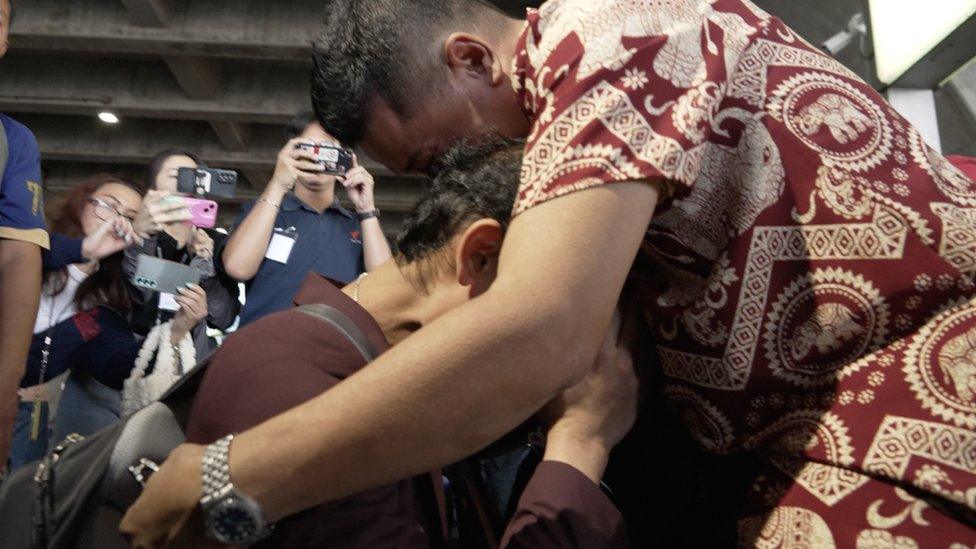
- Published25 November 2023
